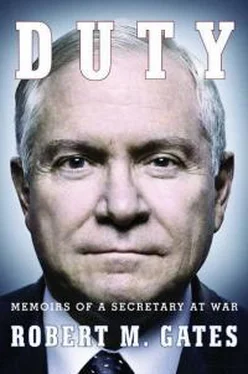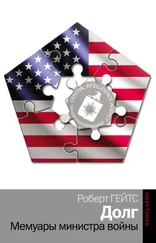In May, I made my first visit to Brooke Army Medical Center in San Antonio, where the military’s finest burn treatment facility is located. I was to visit the Center for the Intrepid, a new rehabilitation facility for amputees paid for by private donations, and also the burn center. I told Pete Chiarelli that I didn’t think I was strong enough to visit the burn unit. He was silent, and I asked him, “Do the kids at the burn unit know I’m coming?” He said yes. I closed my eyes and told him, “Well, then I have to do it.”
I walked into the rehab center at the burn unit, and standing in front of me was Marine First Lieutenant Dan Moran, wearing a Texas A&M Corps of Cadets T-shirt and holding his graduation picture of me handing him his diploma. His beautiful wife and four-week-old baby were with him in the unit. He asked me to sign the graduation picture and then asked if I would present his Navy commendation medal with V for Valor to him at some point at Texas A&M. I said of course. (On October 27, Bush 41 and I presented Dan with his medal at halftime during an A&M home football game, with 85,000 in attendance cheering their lungs out for this young hero. If only all our wounded and veterans could get such recognition.)
The burn unit was nearly full. There was a young soldier who had been there for nearly two years with horrific burns; we did a fist bump because he had no fingers. After a long and heroic struggle, he would die a few months later. I visited a sergeant in an isolated room, badly burned, missing limbs, in a coma. There were others, ambulatory and sharp, who still faced dozens of surgeries in the months and years to come. There are no words to describe their courage. Because Brooke is not in Washington or on a coast, not very many VIPs from any walk of life visit there. The patients would talk about how rarely they got official visitors. After my visit, one Army sergeant told the press that it meant a lot when someone “comes here in person.” He said, “I don’t need more medals or money, just someone to say thanks.”
I would never have forgiven myself had I fallen victim to my self-doubt and not gone to the burn unit. I would visit again on a number of occasions. There are no adequate words to describe the compassion, commitment, and skill of those at Brooke—and at all our military hospitals—caring for our sons and daughters.
Soon afterward I visited the U.S. military hospital at Landstuhl, Germany, where nearly all wounded from Iraq and Afghanistan were sent before returning stateside. I was told I was the only secretary of defense to visit that hospital since the start of the wars in Iraq and Afghanistan. There, for the first time, I presented Purple Hearts, six of them. One was to a young soldier who was unconscious, and I had my initial experience with a mother in my arms crying. The next time I saw him, months later, he was sitting in a chair having lunch at a Pentagon event for wounded warriors. With a certain insouciance, he said, “Bet you don’t recognize me!”
I increasingly felt a personal responsibility for those kids in the hospitals, and it weighed more and more heavily on me. Yet in the hospitals there was still hope. Not so for those who were killed, or for their families.
Every morning, first thing, I would receive written notifications of servicemen and women killed and wounded in combat during the preceding twenty-four hours. There were no names, just a description of what had happened and the raw numbers. Immediately upon taking office, I starting signing condolence letters to parents, a spouse, or a child of someone killed in action. It wasn’t long before just a signature didn’t seem enough, and at night, I started hand-writing notes at the end of each letter. As the surge in Iraq progressed, I was soon signing well over a hundred letters a month. Sometime later even the notes didn’t seem enough. I was determined not to let these men and women ever become statistics for me, and so I asked for a picture of each, and the hometown news accounts of the life and death of their local heroes. I could look at the picture and read accounts from family, friends, coaches, and teachers about how fun-loving they had been, how they loved to fish and hunt, how they excelled at athletics, about their willingness to help others. Or I learned how they had been aimless until joining the military, where they found purpose and direction for their lives. And so virtually every night for four and a half years, writing condolence letters and reading about these mostly young men and women, I wept.
That was in private. But after only a few months as secretary, my emotions over the sacrifices of these amazing men and women in uniform began occasionally to ambush me in public. The first time was in a speech at the Marine Corps Association dinner on July 18, 2007. I was cruising along just fine until near the end of the speech, when I began to talk about a Marine company commander, Capt. Douglas Zembiec, and his actions in the first battle of Fallujah (Iraq) in April 2004. He said his men had “fought like lions,” and he was later himself dubbed the “Lion of Fallujah.” I talked about him volunteering to go back to Iraq in early 2007, but “this time, he would not return—to his country or to his wife, Pamela, and his one-year-old daughter.” I began to lose my composure at that point, though I was able to say that more than one thousand people—including many enlisted Marines—had attended his funeral at Arlington, where an officer told a reporter, “Your men have to follow your orders; they don’t have to go to your funeral.” I simply could not go on. Press accounts would say that I was clearly struggling and suffering. I was. But I finally pulled myself together and closed with these words: “Every evening I write notes to the families of young Americans like Doug Zembiec. For you, and for me, they are not names on a press release, or numbers updated on a web page. They are our country’s sons and daughters.”
This was the real face of war. I never spoke to anyone about the emotional toll on me of the visits to the front lines, the hospitals, and the cemeteries, of sending kids into danger and hardship—a burden that would only grow over four and a half years of war. I would do my duty, I would do everything I could for us to win in Iraq and Afghanistan. But I knew the real cost. And that knowledge changed me.
WALTER REED
On February 18 and 19, 2007, The Washington Post ran a two-part series by reporters Dana Priest and Anne Hull on the administrative nightmare and squalid living conditions endured by wounded warriors at Walter Reed Army Medical Center in Washington, D.C. The series documented a bureaucratic labyrinth faced by soldiers who were in recuperation, seeking further treatment, or deciding whether they could stay in the military despite their wounds. The reporters described, in detail, Building 18, where a number of recuperating soldiers were housed, as rife with mold, filth, leaks, soiled carpets, rodents, cockroaches, and overall shabbiness. There were clearly not enough caseworkers to help outpatients and not enough help for outpatients and families to navigate through the huge hospital complex or the massive and confusing paperwork. I was shocked by the conditions described in the articles. At my morning staff meeting on February 20, I said we had a big problem on our hands, a failure to take proper care of our wounded warriors and their families. That had to be addressed immediately.
Over the next two days, I learned enough to substantiate much of what had been in the Post and to devise how we would respond. On February 23, I met with the president at nine a.m. to confirm for him the seriousness of the conditions at Walter Reed and to tell him I intended to announce that day the formation of an outside group led by Togo West, secretary of the Army and secretary of veterans affairs under President Clinton, and Jack Marsh, secretary of the Army under President Reagan, to look at the situation in depth and recommend remedial actions. I would give them only forty-five days to report their findings. I told the president I intended to hold people accountable and that that could result in some high-level firings. He was entirely supportive. I then went directly from the White House to Walter Reed, where I personally walked through Building 18. In the few days since the articles came out, the place had been cleaned up some, but it was still depressing. I was then briefed on outpatient care and the resource challenges and bureaucratic obstacles that had led to the conditions reported by the newspaper.
Читать дальше












